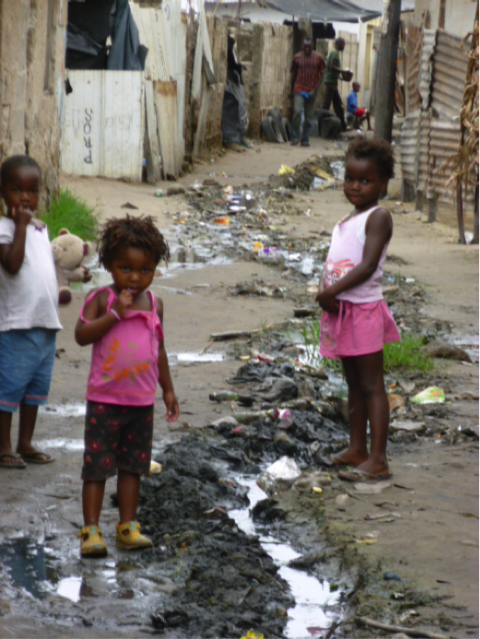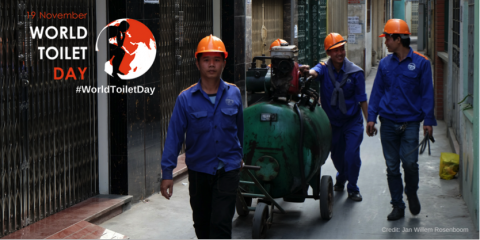Ahead of World Toilet Day on Saturday 19 November, a number of leading organisations came together to call for a renewed sanitation agenda.
Posted originally online on the World Bank’s website on 16 November 2016, the blog post co-authored by the following:
The Bill & Melinda Gates Foundation – Jan Willem Rosenboom
The University of Leeds – Barbara Evans
Emory University – Christine Moe & Eduardo Perez
The World Bank – Sophie Trémolet, Valérie Sturm, Clémentine Stip
WaterAid – Andrés Hueso
Plan International – Darren Saywell

Children in Maputo, Mozambique. Photo credit: Isabel Blackett/The World Bank
A successful city is economically and culturally vibrant, healthy, safe, clean and attractive to business and tourism, and provides quality of life to its citizens. This vision is appealing but remains hard to realize as developing cities have to cope with changing demographics and climate with limited financial and human resources. The sustainable development goalshave given a new impetus for cities to be inclusive, safe, resilient and sustainable (SDG11), ensure citizens’ health and wellbeing (SDG3) and secure access to sustainable water and sanitation services (SDG6).
World Toilet Day on November 19th is the opportunity to remind ourselves of a few facts and propose a set of guiding principles for a renewed and revitalized urban sanitation agenda.
Many cities struggle to deal with the most basic municipal task of managing human excreta. Some are effectively “drowning” in human waste. Urban population growth continuously outpaces gains in improved sanitation access and, globally, nearly one billion people live in urban slums with poor or no sanitation. Only 26% of urban excreta is deemed to be safely managed. The results? Environmental degradation, endemic disease leading to mortality and morbidity, especially among children, poor school attendance and performance, low productivity, constraints on the delivery of essential urban services such as housing, transport, safe water and drainage, and, ultimately, limits on economic growth and urban development. In short, a silent crisis that impedes the realization of the urban transformation framed in SDG11.
Urban sanitation has a fundamental role to play in achieving the SDG goals identified above. Business as usual will fail to deliver the kind of sanitation that underpins the envisioned urban transformation, by operating at too small a scale and focusing on infrastructure alone rather than on city-wide solutions. What is required is a radical shift in mindsets and practices towards an urban sanitation approach that impacts political priorities, funding, planning, design, management and governance.

Mobile desludging tank being wheeled out of an alley in the city of Hanoi, Vietnam. Photo credit: Jan Willem Rosenboom
This radical shift will require the engagement of all stakeholders and a political transformation that touches all citizens, rich and poor, informal and formal, to facilitate the roll out of universal urban sanitation services. This is critical not only for reasons of equity, and to respond to the human right to sanitation, but also because the consequences of inadequate sanitation eventually affect everyone, as excreta-related pathogens spread easily across dense urban environments.
To make progress, urban development professionals and stakeholders need to better understand how sanitation impacts the functions and form of the city and how it supports economic development and promotes equity. To achieve sustainable, equitable and safe management of excreta for the whole city, sanitation sector professionals must transform their thinking and practices to deploy both old and new solutions in smarter ways.
We, from The Bill & Melinda Gates Foundation, The University of Leeds, Emory University, WaterAid, Plan International and The World Bank, have come together as a group of practitioners to galvanize this agenda by sharing conversations globally and mobilizing contributions from decision-makers and other practitioners across disciplines.
We propose that this renewed urban sanitation agenda should aim to:
- Embed sanitation within the framework of urban governance and municipal services provision.
- Establish clear roles and responsibilities, with accountability and transparency.
- Provide ‘safe management’ of excreta throughout the sanitation chain – for both onsite sanitation and sewers – to ensure separation of fecal contamination from people across the whole city.
- Focus on outcomes rather than technologies – allowing for diversity of solutions and approaches.
- Base decisions on secure operational budgets being available (including for operation and maintenance).
- Facilitate progressive realization, building on what is already in place.
- Commit resources to training city leaders and technicians of the future to solve complex problems rather than deliver predetermined solutions.
- On this World Toilet Day, we invite you to join us in responding to this shared responsibility.
Related:
Toolkit: Tools for diagnosing urban sanitation challenges
Blog: Targeting urban sanitation: Looking behind aggregated city-level data
Blog: Fecal Sludge Management: the invisible elephant in urban sanitation
Blog: 5 lessons to manage fecal sludge better
Blog: A tale of two cities: how cities can improve fecal sludge management